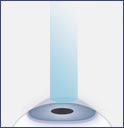PRK Surgery
 As the first refractive procedure approved by the FDA, PRK eye surgery is a tried and true vision correction alternative that continues to help patients reach their vision potential.
As the first refractive procedure approved by the FDA, PRK eye surgery is a tried and true vision correction alternative that continues to help patients reach their vision potential.
PRK Eye Surgery vs. LASIK
Before LASIK, PRK was the refractive procedure that doctors and patients trusted. Although LASIK has become a more popular procedure, PRK is still very safe and effective in treating certain patients that may not qualify for LASIK. In PRK, there is no need for the doctor to create a flap before the corneal laser treatment, so PRK may be a good alternative option for patients with thin or steep corneas or moderately dry eyes. PRK may be recommended to treat nearsightedness, farsightedness, and astigmatism.
PRK FAQs
Q. How does PRK Eye Surgery differ from LASIK?
A. Although the excimer laser is used to reshape the cornea in both PRK and LASIK, with PRK, there is no creation of a corneal flap. The laser is applied directly to the outer layer of the cornea, whereas with LASIK the inner layer is targeted. PRK has a slightly longer healing time than LASIK, and improved vision may take up to a week to become apparent. The results of both LASIK and PRK are similar.
Q. What are the chances of great results with PRK?
A. The majority of patients who choose to have PRK will enjoy the benefits of 20/20 vision or better! The complication rate associated with PRK is extremely low. Dr. Berg will be able to give you a better idea of what to expect during your free eye consultation.
Q. What are the risks associated with PRK?
A. Laser surgery presents a small amount of risk to patients. There is a chance that some patients may experience light sensitivity, glare, or halo effects following the procedure. The fluctuation of vision is also possible until stability is achieved, usually between 6 months and one year. Patients with high levels of nearsightedness may also be at an increased risk of developing corneal haze. It is important to remember that the majority of PRK patients do not experience negative side effects with the exception of mild discomfort during healing.
Q. What is the recovery period like?
A. Your healing time and progress will depend on a variety of factors, such as overall health, medical history, and adherence to post-operative instructions. The majority of our PRK patients are able to return to work within a few days and can return to exercise and other activities as directed. The protective layer of the eye generally takes up to 5 – 7 days to heal, so it is especially important to follow your doctors care recommendations. Patients will regain natural vision an average of 5 – 7 days following the procedure.
Q. Who can benefit from PRK?
A. Patients who are nearsighted, farsighted, or have astigmatism can benefit from PRK. After a thorough eye examination and evaluation of your overall health condition, Dr. Berg will let you know if PRK can help your vision.
Q. Are both eyes treated at the same time?
A. Yes, many patients can choose to have both eyes treated together, but one eye can also be treated at a time.
Q. Are the effects of PRK treatment permanent?
A. PRK is designed to be a permanent correction of the cornea, although it will not prevent vision abnormalities that occur as a result of aging. It is important that patients considering PRK make sure their prescriptions are stable, meaning the degrees of correction have not changed over the last year.
PRK Introduction
PRK eye surgery is quite comparable to LASIK in terms of visual results, however, healing time may be a little less rapid than with LASIK.
During PRK, your doctor will administer anesthetic and proceed to gently reshape the cornea using CustomVue Wavefront-guided treatment. No corneal flap is made, so the laser directly reshapes each eye’s cornea outer layer in very little time. Once the desired corneal alterations are achieved, patients should be able to correctly focus on improved vision within a few days. After a successful PRK procedure, patients enjoy tossing out their old glasses and contact lenses!
For state-of-the-art PRK treatment, trust the vision leaders at Berg·Feinfield Vision Correction. Contact us today for your complimentary one-on-one vision consultation.
 As the first refractive procedure approved by the FDA, PRK eye surgery is a tried and true vision correction alternative that continues to help patients reach their vision potential.
As the first refractive procedure approved by the FDA, PRK eye surgery is a tried and true vision correction alternative that continues to help patients reach their vision potential.







